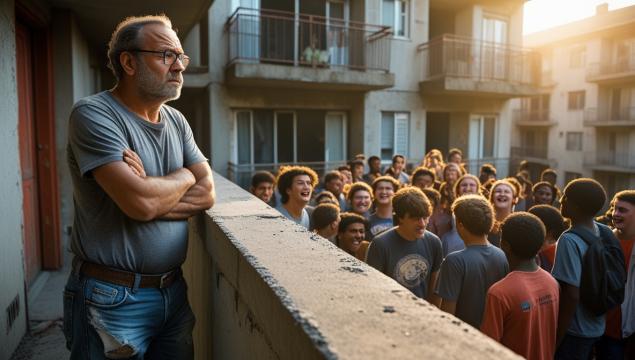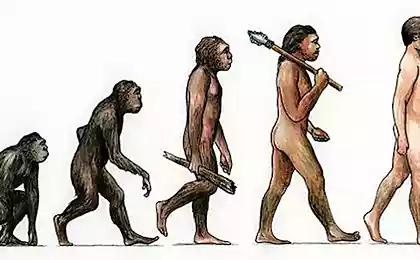297
How old are you? The evolution of a young man into a grumpy (joke with a bit of a joke)
How old are you? Scientific classification of the stages of turning a young man into a grumpy

Every man goes through an amazing metamorphosis from a carefree young man to a classic grandfather who grumbles at young people and demands silence. It's not just age-related change -- it's a whole science of social behavior that can be studied and even controlled.
Scientific foundations of grandfather evolution
According to research by Stanford University psychologists, the process of becoming a “grandfather” begins as early as 25-30 years and is associated with changes in the neuroplasticity of the brain. Decreased dopamine production leads to decreased tolerance to new stimuli, including loud music and unusual behaviors.
Anthropologist Margaret Clark of Oxford defines this phenomenon as “territorial protection syndrome” – an evolutionary mechanism that forces adults to protect their space from potential threats that subconsciously perceive active behavior of young people.
The Five Stages of Old Man Transformation
Stage 1: Barely noticeable signs 25-30 years
At this stage, the young man begins to notice that the music in the bars has become "too loud." There is a strange desire to go to bed at 23:00 instead of the usual 2:00 in the morning. The first complaints about “these young people” are still humorous, but already contain the seeds of future grumble.
Characteristics: buying earplugs, interest in news, the first back pain after sleeping on the sofa.
Stage 2: Active Criticism 30-40 years
Criticism of youth is becoming more systematic. There is a saying, “This is our time.” The music is really starting to get in the way, especially the ones playing in the neighborhood. An acute sensitivity to disorder and “wrong” behavior of others develops.
Diagnostic criteria: Regular complaints of the management company, buying slippers with a closed nose, interest in gardening.

Stage 3: “Territorial defense” 40-50 years
The house becomes a fortress that must be protected from external stimuli. The syndrome of "sacred silence" develops - a pathological need for the absence of extraneous sounds. The ability to determine the source of noise with accuracy to the apartment.
Progressive symptoms: Knowledge of the names of all neighbors and their habits, a collection of phone numbers of various services, a developed system of monitoring the yard.
Stage 4: Philosophical Understanding 50-60 years
Criticism of youth acquires deep philosophical foundations. There are theories about the degradation of society, the impact of technology on the brain and the loss of moral values. Expertise is developed in all matters related to the right life.
Key skills: The ability to find negative consequences in any innovation, knowledge of all the laws of silence, the ability to give long lectures about life.
Stage 5: “Full grandfather realization” 60+ years
Reaching the peak of grandfather's abilities. Music interferes even at a minimum volume, young people are criticized automatically, develop hypersensitivity to any changes in the environment. Paradoxically, at this stage often comes the adoption of his role as “grandfather of the court”.
Mastery includes: intuitive determination of time by sounds, the ability to predict the behavior of neighbors, deep knowledge in the field of housing and communal services.
Important discovery of scientists
Research from the Institute of Age Psychology showed that grandfather transformation is reversible! Regular communication with young people, learning new technologies and consciously expanding your comfort zone can slow down or even reverse the process in the early stages.
Practical recommendations: how to manage the process
For those who want to slow down,
- The Conscious Tolerance Technique: Listen to music every day for 15 minutes that you don’t like. This trains the neural pathways of tolerance.
- The Active Curiosity Method: Instead of criticizing young people, ask yourself, “Why are they doing this?” This involves analytical thinking instead of emotional rejection.
- Flexible Mode Practice: Break your usual daily routine once a week. Go to bed an hour later or earlier.
- Social immunotherapy: Talk to people 10-15 years younger than you. This supports cognitive flexibility.
551618
For those who have embraced their grandparent nature:
- Constructive grunt: Instead of simple complaints, offer solutions. "Music is loud" “What if I put in soundproofing?” ?
- Granddad's mentoring: Use your experience to educate young people, not just criticize them.
- Territorial diplomacy: Talk to your neighbors about hours of silence instead of conflict.
- Evolutionary acceptance: Remember that you have an important social function as a guardian of order and tradition.
Grandfather's superpowers: unexpected pluses
Modern research shows that “grandfather” traits have evolutionary significance. Increased sensitivity to noise develops the ability to deep concentration. Critical attitude to innovation protects against impulsive decisions. Territorial behavior creates stable social structures.
New York University psychologist Jonathan Haidt calls this the “wisdom of conservatism”—the ability to see the long-term effects of change that young people have yet to develop.
Conclusion: Accepting grandfather evolution
Turning into a “grandfather” is not a degradation, but a natural adaptation to the changing needs of the body and social role. Understanding this process allows you to either consciously slow it down or accept it with dignity, turning potential disadvantages into advantages.
The main rule of healthy bullying is to maintain the ability to self-irony and remember that each generation passes this path in its own way, but passes it necessarily.
Glossary
Neuroplasticity is the ability of the brain to change its structure and function in response to experience and learning.
Dopamine is a neurotransmitter responsible for feeling pleasure and motivating new experiences.
Territorial protection syndrome is a behavioral pattern aimed at protecting personal space from external influences.
Cognitive flexibility is the ability to adapt thinking to new situations and switch between different tasks.
Social immunotherapy is a method of training tolerance by gradually increasing contact with irritating social stimuli.
The wisdom of conservatism is the psychological ability to anticipate the negative consequences of rapid change.
9 Reasons to Admit Your Feelings to a Girl, Even If You’re Not Sure About Reciprocity
Why it’s important to follow the “no contact” rule after a breakup






















